
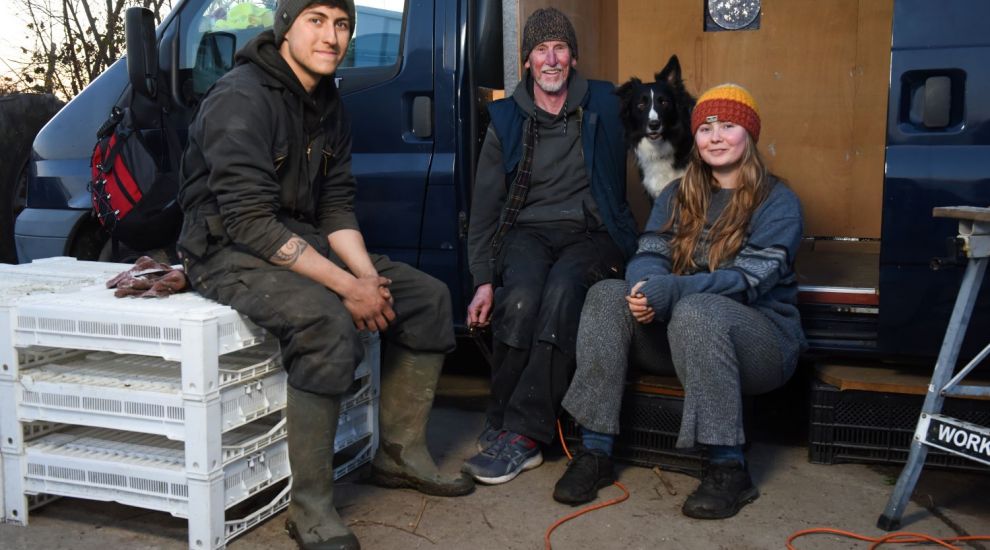

Carbon neutrality, food security, the decline in farming, care in the community and the young ‘brain drain’ due to the high cost of living in Jersey are all topics that have risen to the top of the island’s agenda in recent years.
Could a new organic revolution be part of the answer? One young local couple – for whom a chance meeting saw them divert plans from moving to Portugal and buy an organic farm instead – certainly think so.
Six months ago, Jamie Ribeiro and Anna Houiellbecq knew nothing about organic farming. They don’t come from farming backgrounds, they haven't taken courses in agriculture, and they certainly never grew up expecting to become farmers.
But this 23-year-old couple are the new owners of Greenacres Farm in Sion, St. Helier, which means they have embarked on a steep learning curve – one that would put off the faint-hearted, but both are enjoying the climb.
“Everyone says you have to be strong-willed, because farming is not easy,” Anna said. “But I love it. I find even the hard tasks enjoyable. I would much rather have a hard day on a farm than an easy day in the office.”
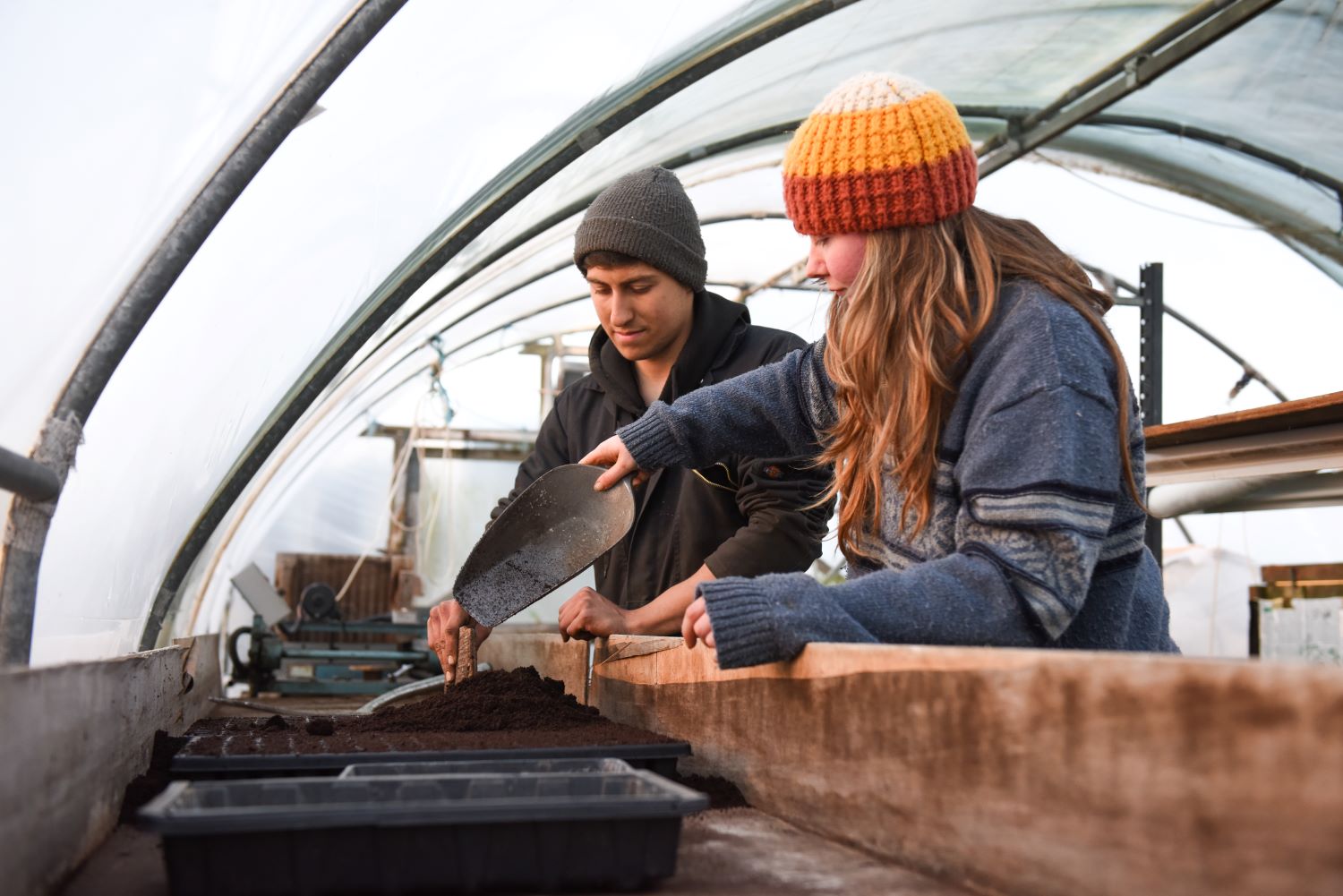
Pictured: "I would much rather have a hard day on a farm than an easy day in the office.”
“I grew up wanting to do something different. I didn’t want to go into an office job or follow someone else’s plan. We took it a day at a time, doors would open, doors would close, and it led us here. I didn’t even think about leaving school and becoming a farmer, because most of the time you’re brought up in a farming family or you inherit land. We never thought we would have the opportunity to own a farming business.”
Their new business is called Bloom ‘n Goodness and its motto is ‘Eat Good, Live Good’.
They are in the process of planting the seeds for the future – quite literally.
In two of their six polytunnels, they’ve already planted 2,000 leeks, 2,000 onions, peppers, cut flowers, and much more, including a crop of Jersey Royals which will be ready this month.
“We had blight early on, which was something we had to remedy using organic methods. This involved picking the diseased leaves by hand and spraying copper. It was our first big lesson,” Jamie said.
Their latest effort is an expansion into poultry, and they have 12 chickens, with 30 more arriving soon.
“A year, or even six months ago, I never would have dreamed this would be a reality,” said Anna.
The reality came into being in October when Mike Greenwood, Anna’s boss at Woodside Flowers and the previous owner of Greenacres, offered Jamie a place to keep his tools on the site.
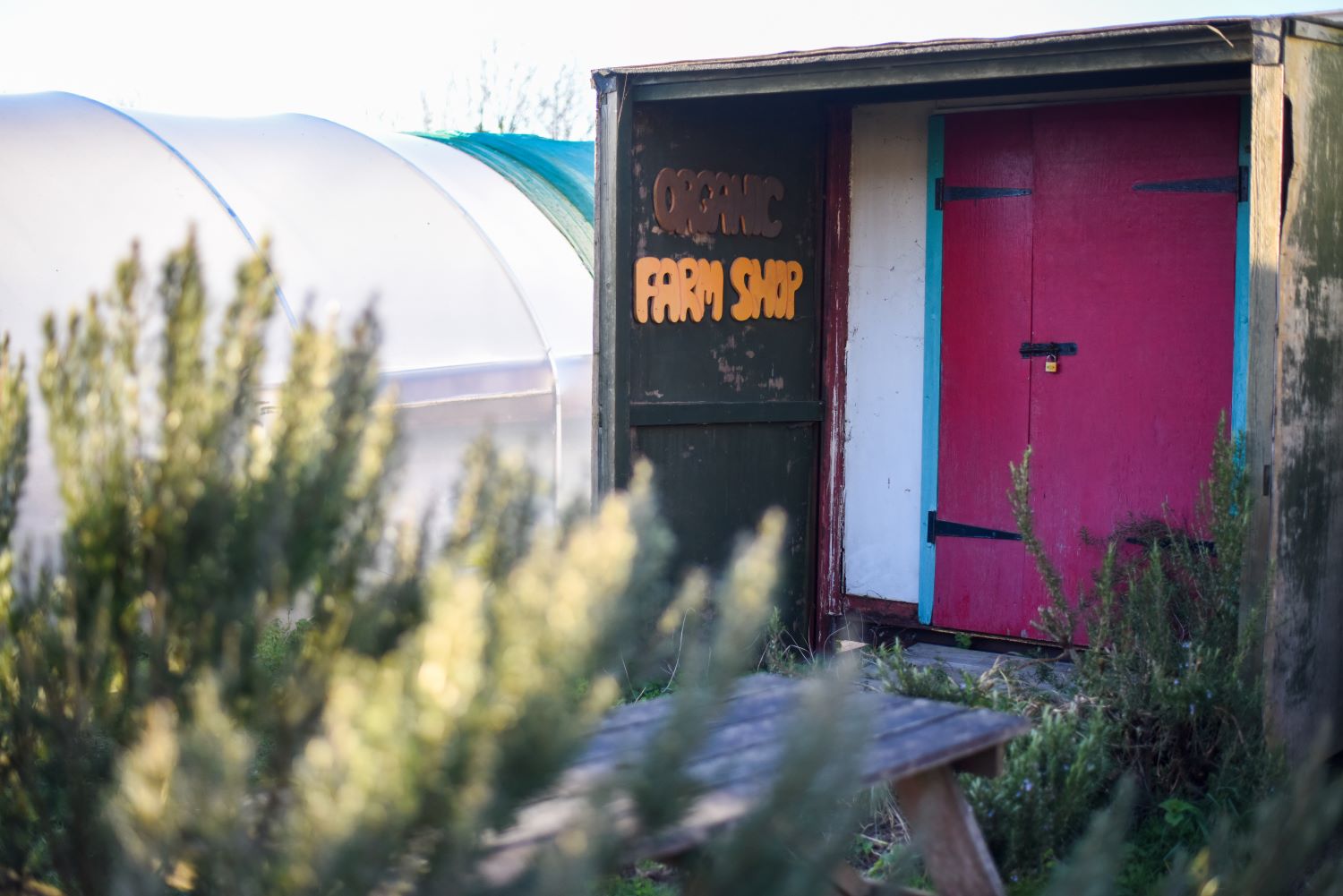
Pictured: The motto of Bloom ‘n Goodness is ‘Eat Good, Live Good’.
“As soon as I saw the place, we said, ‘If we were to make you a cheeky offer, would you accept it?’ We had almost bought a house in Portugal to create a homestead. In Jersey, no one our age has enough money to buy a house to get a mortgage, and we had enough savings for this place, so we thought why not put those savings into something which could generate a little bit more later on?”
Greenacres is a unit, meaning it has polytunnels, outdoor field space, the shop, access to a main road, and all the infrastructure that is needed to be fully self-sustainable. The lease also stipulates that the farm must be kept organic.
It just happened that Mike was considering selling, and they had been the first to ask at the right time. Anna and Jamie went 50-50 on an offer – “and we’re now very broke”.
“There’s no money in farming, that’s what everyone has been telling us... But it’s the lifestyle that matters. We just want a nice, relaxing life on the land where there is meaning to what we’re doing.
“It is a huge risk, because it’s all our savings, we probably won’t be able to afford a mortgage any time soon, but, if you knew us, you wouldn’t be surprised. We’re definite risk-takers. The biggest risk, the biggest reward.”
As of now, Anna continues to work as a florist, and Jamie, who is a mechanic by trade, bartends three nights a week. They also sublet half their field to Master Farms.
“Unfortunately, you can’t pay rent in vegetables,” Jamie said. “By the end of the year, we will hopefully be creating enough income to work here full-time. But until the plants come up, it’s a money pit – you put everything into it, and then just wait for it to come out.”
“We do have a really good support network, friends and family come up to help when they can.”
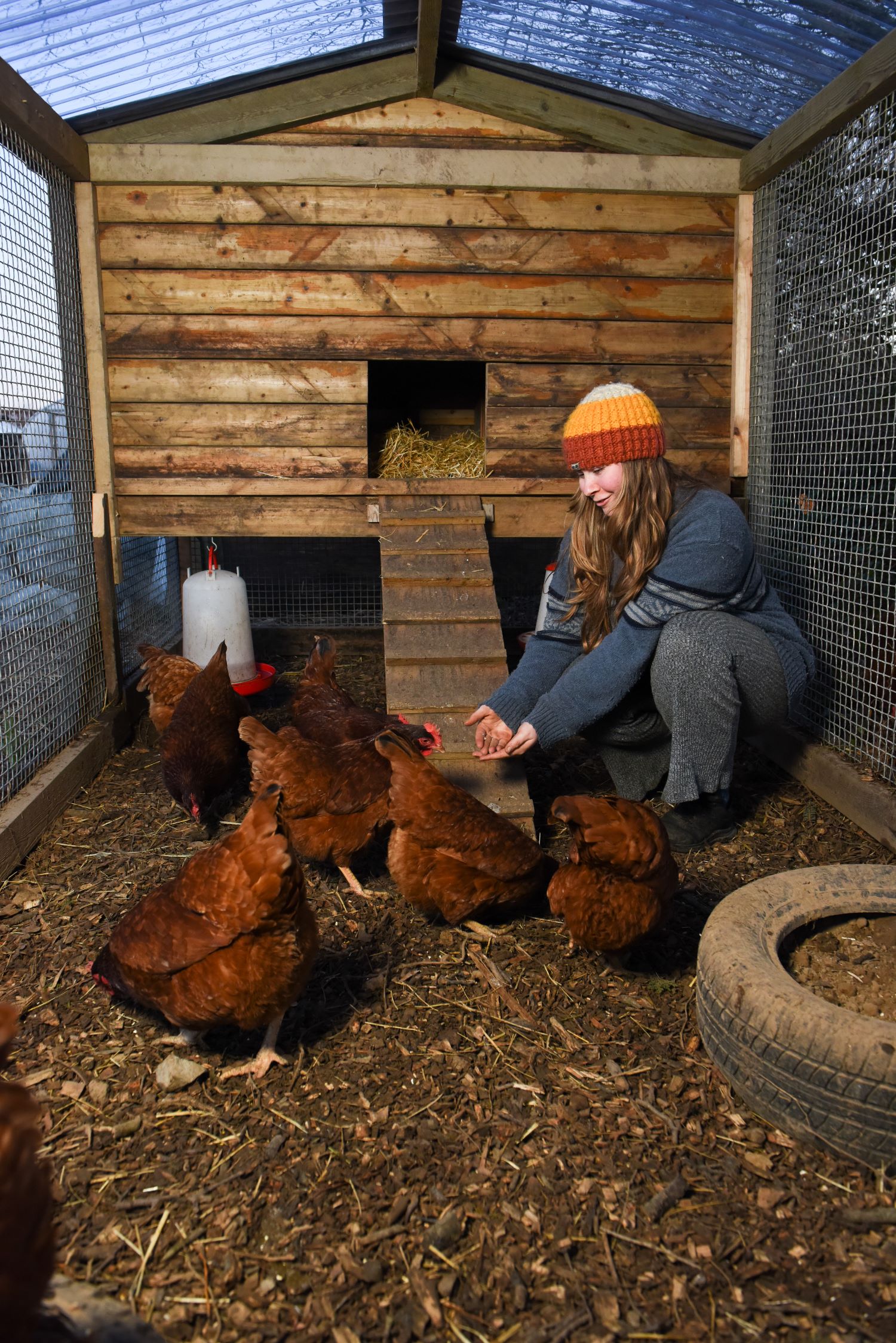
Pictured: Their latest effort is an expansion into poultry, and they have 12 chickens, with 30 more arriving soon.
The only one saying “don’t do it” was Brian Adair, the now-retired founder of Greenacres Farm and a key figure in Jersey’s organic farming community. He doubles as a “human dictionary” about organic farming, and has been mentoring Jamie and Anna.
“I know how difficult it is,” Brian said. “The bugbear is always financing. If the Jersey government are trying to kill organic agriculture, then they’re doing a really good job. They protect the Jersey cow, but if they didn’t, it would be gone tomorrow. Do you think the supermarkets wouldn’t just import UK milk? I honestly don’t know why there isn’t more support for smallholders.”
In 2013, an independent review was undertaken to assess the Jersey’s current organic farming sector and its environmental and social impact on the island.
In an increasingly unstable world with growing populations, environmental issues, and finite resources, the review concluded it was important that the sustainable management of farmland delivers quality food in the necessary quantities, thriving wildlife, recreational facilities, employment and successful business, all while ensuring resource protection, high standards of animal welfare and avoidance of pollution and minimising climate change.
With the climate crisis now at the forefront of policymakers and legislators’ minds, perhaps it’s a good time to renew support?
Organic farming “ticks all the right boxes – environmental, social, climate”, according to Brian. “It’s about working with nature, instead of trying to dominate it. In standard farming, you reach for the spray bottle if you have problems, but organically, you don’t use sprays… It’s using rotations, building up the fertility of your soil, using mechanical methods of weed control, close-up planting. It is a systems approach. Growing organically is a see-saw balance with nature, you gently tilt it in your favour. Healthy soil, healthy plants, healthy people.”
The 2013 review concluded that organic farming in Jersey will not thrive without a strategic plan.
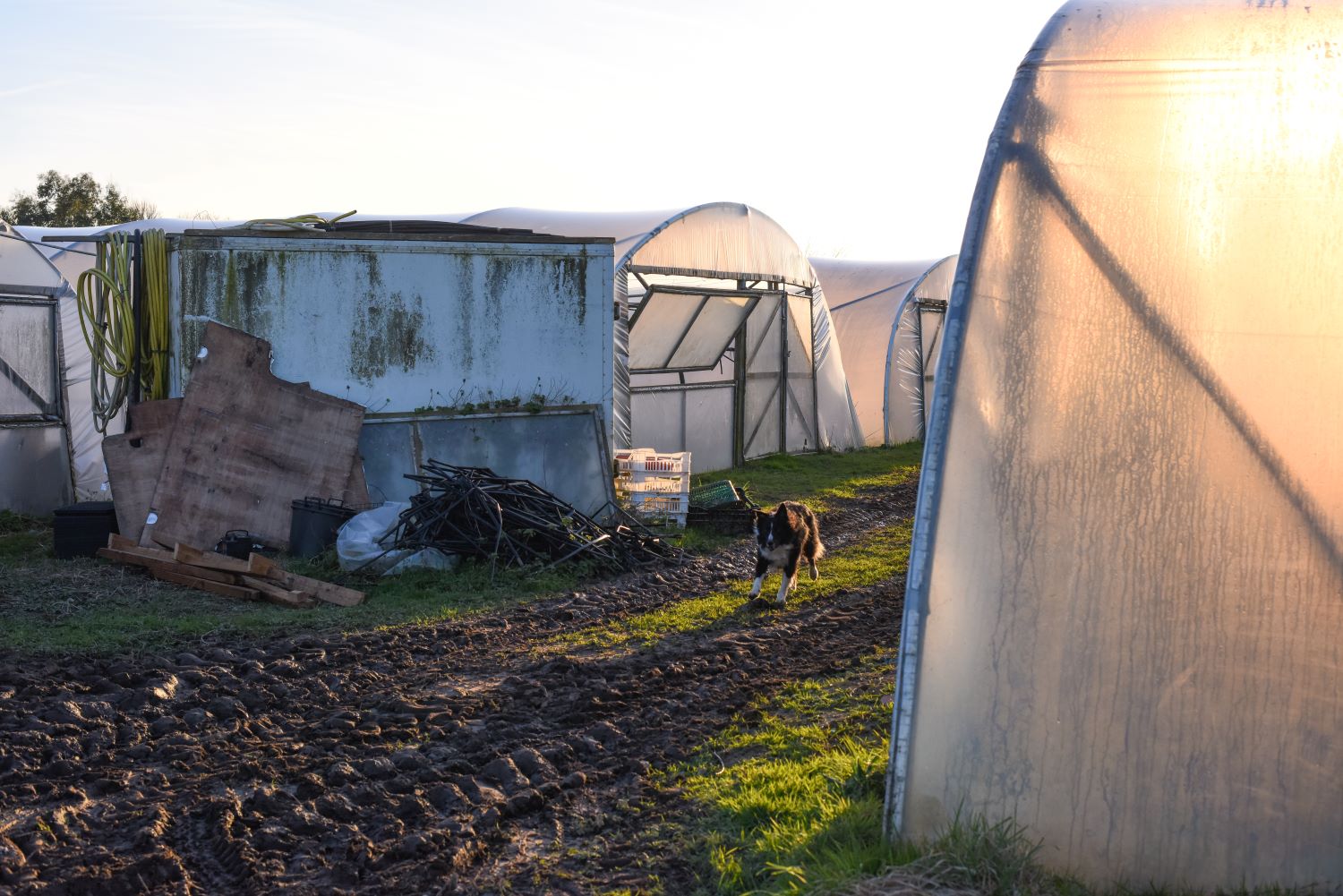
Pictured: Organic farming “ticks all the right boxes – environmental, social, climate”.
A subsequent 2014 ‘Action Plan to Support Organic Farming’ aimed to grow organic farming in Jersey from 3% to 6% of available farmland, enhance its public perception, and ensure government provides adequate support for organic producers so that they are not disadvantaged in comparison to conventional farmers.
Despite government support payments, the area of organic and ‘in-conversion’ land declined from 2,479 vergées in 2008 to 890 vergées in 2015 (2.6% of the agricultural area in Jersey). Brian said that more support could boost that number again – but not necessarily in the form of funding:
“Support it verbally and support it with policies – give organic farmers your whole-hearted support, because organic is an environmental, carbon neutral, healthy way to farm and that should be welcomed. Get behind that, don’t just throw money at it… They talk of being carbon neutral, but this is where they can do it.”
Jamie says “little things” would help. “I know that it’s cheaper to import than to buy locally, but if they made it harder to import, or maybe you had to buy a certain percentage locally.”
He continued: “The new scheme is still area-based, which is difficult when you have an intensive organic farm like ours and there is a lot of diversification going on. For an 8-vergée farm like ours, where we’re only using 1.5 at the moment, you don’t get a lot. A lot of organic farmers I’ve spoken to have told me it was a waste of time trying to get funding.”
“Including me,” Brian added. “When I was growing, for organic you had to fill in a detailed business plan, and it took a whole day to do that. In the end, I would get about £89 for my farm. It wasn’t even worth it.”
Anna believes support is the public’s responsibility too: “A lot of farms have closed because the consumers won’t pay what is needed to be paid for the farms to survive. Businesses in Jersey could help, either financially or with marketing. Since we’re such a small-knit island, we should be supporting one another.”
Brian believes that supporting local agriculture “would solve the island’s food supply problem”.
“There’s Brussel sprouts, there’s broccoli, there’s calabrese, where is it coming from? Here, there are beautiful soils, experienced growers, and yet we’re bringing all this in from the UK. The only reason is because it’s not cost-effective.”
Former Environment Minister Deputy Steve Luce takes a different line. He oversaw the Rural Economy Strategy, in which organic farming is given only one page out of 175, but he believes that it doesn’t mean organic farmers “are not being listened to”.
“If it’s a question of trying to feed the population, it’s very unlikely we will be able to do that by organic. We will always be reliant on imports.
“We are never going to feed the population of the island with all locally grown food – the amount of vergées will simply never be able to create enough calories.”
“…Organic farming is particularly challenging, because it costs money to convert from conventional, and at the end of the process, outputs are not as great as they were if you were farming conventionally.”
But the young couple remain optimistic – and Brian thinks they are doing “amazingly”.
“It’s a very skilful business, there is an art and craft to growing, and for a younger person who doesn’t own their own house or oodles of money to throw at it, it is very difficult.”
Jamie and Anna are rare as a young couple in farming – the rules and restrictions and “needing to have the land” make it “nearly impossible to get into it”.
Economic Development Minister Kirsten Morel is actively working to solve this problem with a Farming Foundation in the Rural Economy Strategy that could potentially own land to let out to young farmers.

Pictured: The young couple remain optimistic.
“It’s time for younger people to get involved and know that there’s a chance for them to get involved. Those are the ones that want to make a difference, to come in with the new methods of farming and to help the environment, be organic and regenerative,” Anna said..
When their crops are ready, Jamie and Anna plan to revive a small farm shop at the entrance, which used to be run by Brian – but their main plans are a veg box scheme.
“We have loads of crates kicking around, so we’re going to be filling those up, and people can be on a weekly or monthly subscription. Our motto is, ‘know your farmer, know your food’. There’s a lot of interest to get in contact with where your food actually comes from.”
“We don’t want to get involved with wholesalers, we want to avoid the middleman and just go straight to the public.”
There are also plans to turn Greenacres into a therapeutic farm in future, and Anna is currently training in counselling.
“We would invite people who are vulnerable, children, people with disabilities, elderly, those out of prison. We would love it not just to produce, but to allow people to come and grow themselves too.
“That’s why we called it Bloom ‘n Goodness, because we don’t just want to grow goodness in the ground, but we want to grow goodness in people and in the community too. It’s just as much about people as about vegetables and flowers.”
Comments
Comments on this story express the views of the commentator only, not Bailiwick Publishing. We are unable to guarantee the accuracy of any of those comments.